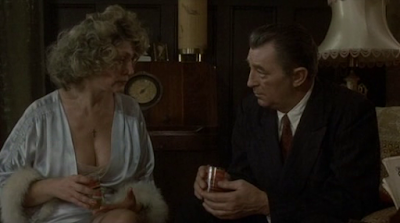D: Dick Richards. P: George Pappas, Jerry Bruckheimer. W: David Zelag Goodman. Ph: John A. Alonzo. M: David Shire. St: Robert Mitchum (Philip Marlowe), Charlotte Rampling (Helen Grayle/Velma Valento), John Ireland (Lt Nulty), Sylvia Miles (Jessie Florian), Anthony Zerbe (Brunette)
“Everything I touch turns to shit”
Private eye Philip Marlowe looks down from his hotel window on LA’s neon
sprawl, ruminating on summer heat, growing old, feeling weary. A new case
shakes him up, mountainous ex-con Moose Malloy hiring him to find his beloved
Velma, somewhere out there in that city of fallen angels.
In adapting anew Raymond Chandler’s second Marlowe mystery, source of
a classic 1944 noir, the filmmakers’ wisest investment was not in period-specific
production design, impressive as that is. Rather it was in securing the
services of Robert Mitchum, a man as talismanic in noir terms as the character
he was belatedly interpreting. “I always felt that Chandler had Mitchum in mind
when he developed the Marlowe character,” said director Richards.[1]
It is a role that fits the actor rather better than the shabby suit he wears
throughout. (This too was a period piece – it was originally made for Victor
Mature in 1940.)
Pushing 60, Mitchum brings a rumpled dignity to the part. The sourness
of his deliberations is tempered by the sardonicism of his delivery; the
privations and disappointments characteristic of noir’s nocturnal ramblers
nestling as snugly in the seams of his face as they do in the folds of that
suit. His features are like a map of those mean streets down which Chandler and
other noir scribes sent their dark knights, in mazy plots like the one that
demands close attention here.
The script is generally loyal to the novel in plot and tone (the main revisions
ramp up Marlowe’s emotional involvement). Interwoven are sharply drawn
secondary characters – boxer Jack O’Halloran’s monolithic Moose; Sylvia Miles’ lonely,
liquor-sodden ex-showgirl – and false trails lined with hazards: the quest for
a stolen jade necklace; a run-in with a terrifyingly butch madam, whose vicious
slaps Marlowe answers with a punch in the mouth.
Given the time it was made, the filmmakers could be more open than
their forebears about civic sleaze and moral degradation, and more aggressive
about police corruption. Marlowe’s cynicism on this point is given greater emphasis.
When the cops press him for Moose’s whereabouts after the latter kills a black
bar owner, this is clearly not SOP – “You’ve got a dead negro. Nobody gives a
shit. So what’s changed?” he demands rhetorically, knowing the case has piqued
the interest of gambling kingpin Brunette, a man with political influence and
high-society friends. Among these is wealthy Helen Grayle, who comes on to
Marlowe (“She was giving me the kind of look I could feel in my hip pocket”) and,
it transpires, bears an uncanny resemblance to Velma...[2]
Private eyes had enjoyed a renaissance since the mid-Sixties in guises
both archaic (Tony Rome, Chandler) and archly modern (Harper, Shaft, Shamus), in
stories steeped in alienation, cynicism and isolation (Klute, Hickey & Boggs,
Chinatown, Night Moves). The vogue incorporated overt pastiches (Gumshoe, The Black Bird, The Late Show,
The Big Fix) as well as updatings of
classic material: Chandler’s The Little
Sister became Marlowe in 1969; The Long Goodbye subjected to Robert
Altman’s revisionist scalpel in 1973.
From Goodbye to Farewell – Elliott Kastner backed both
films and intended the latter also to have a contemporary setting. Richards convinced
him to make it a period piece – a fully fledged tribute to the golden age of
noir. He shot mostly at night. Locations were all vintage properties; the
images given an antiquated, amber hue (afterglow, perhaps, from Richards’ wonderful
Culpepper Cattle Company); Mitchum’s
presence enormously evocative of Hollywood’s dark past.
There is an element of nostalgia for its own sake, yet the script is sufficiently barbed to engage a modern audience, complemented by Seventies sleaze and violence. And Mitchum exhibits both the jaded sensibility of the contemporary antihero and a moral clarity distinct from his murky surroundings – in that respect he is not so far removed from Elliott Gould’s antithetical Marlowe in The Long Goodbye.[3]
Rarely has an actor been so perfectly matched to his material. “This would be Mitchum’s Ride the High Country, his True Grit… the [role] that acknowledged a hero grown old, the summing up that reflected upon all that had come before.”[4]
Kevin Grant
[1] Quoted in Raymond Chandler in Hollywood, by Al Clark (Silman-James Press, 1996)
[2] Helen/Velma’s husband, an aged judge, is played by revered crime writer Jim Thompson
[3] Mitchum reprised the role in 1978 in Michael Winner’s modern-day version of The Big Sleep. But he seemed to be going through the motions, perhaps uninspired by Winner’s banal treatment
[4] Lee Server, Robert Mitchum: Baby, I Don’t Care (Faber & Faber, 2002)









No comments:
Post a Comment